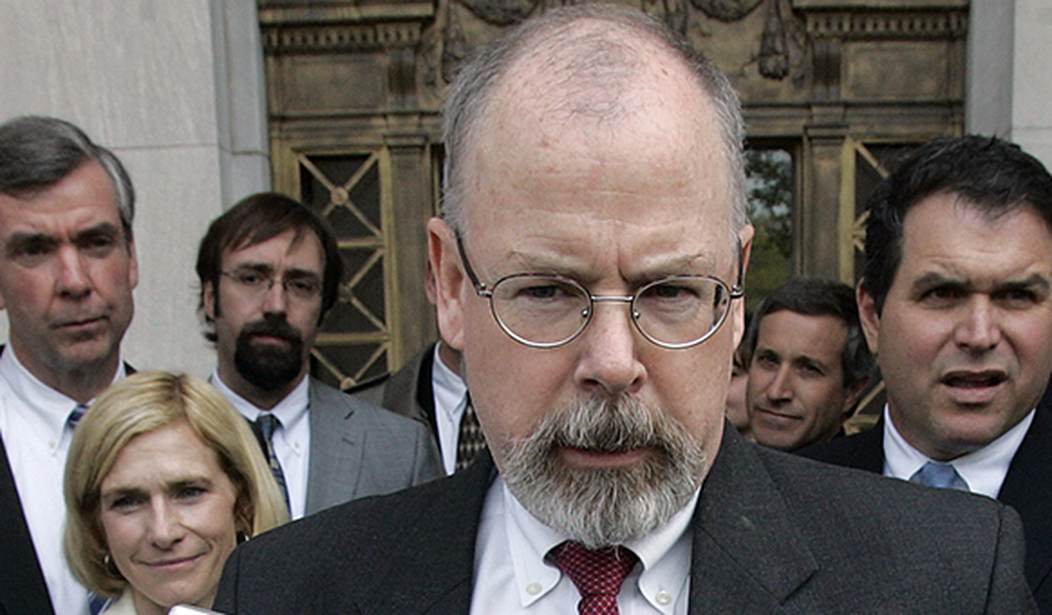This was one heck of a Friday afternoon document dump. According to a court filing just before Easter weekend, special counsel John Durham alleges that the material supplied by Michael Sussmann to the FBI that supposedly showed a connection between Donald Trump and Russia-connected Alfa Bank was “user-created” — in other words, a concoction. But by whom? That’s precisely what Durham tells the court he wants to find out:
In a court filing on Friday, Special Counsel John Durham asserted that the alleged relationship with the former President and Russia – which Clinton lawyer Michael Sussmann concluded – was ‘user-created.’
Sussmann is accused of lying to the FBI in September 2016 saying he didn’t work for the Clintons when he presented the ‘purported data and “white papers” that allegedly demonstrated a covert communications channel’ between former president Trump and Kremlin-tied Alfa Bank.
Durham also alleged Sussmann gave the CIA information about Trump in February 2017. He said the agency concluded the information wasn’t true.
‘While the FBI did not reach an ultimate conclusion regarding the data’s accuracy or whether it might have been in whole or in part genuine, spoofed, altered, or fabricated, [the CIA] concluded in early 2017 that the Russian Bank 1 data and Russian Phone Provider 1 data was not “technically plausible,” did not “withstand technical scrutiny,” “contained gaps,” “conflicted with [itself]” and was “user-created and not machine/tool generated,”‘ he wrote in the court documents filed Friday.
He did, however, say the Special Counsel’s Office ‘has not reached a definitive conclusion in this regard.’
The Alfa Bank theory fell apart during Robert Mueller’s investigation, and it has largely been forgotten until now. The allegation that Trump and Vladimir Putin connected through Alfa Group made it very easy to connect dots for the “collusion” theory of the 2016 election. It was one of the more explosive allegations in the original Christopher Steele dossier, which has fallen apart in several aspects. (Oddly, no one seemed to mind that the dossier misspelled it as “Alpha Group” at the time.)
One question this filing prompts now is why it took over five years to find out that the FBI thinks the “evidence” for the Alfa connection was cooked. Durham’s careful to keep from declaring a conclusion, and it’s likely to be an issue for the jury to consider. But how difficult would it have been to check the data in late 2016 or early 2017 and determine that it wasn’t “technically plausible,” “conflicted with itself,” and therefore the Steele dossier was unreliable? For that matter, why hasn’t the Special Counsel reached a conclusion on that point five years later?
If it does turn out to be “user-created and not machine/tool generated,” then Katy bar the door in court. Durham will have to prove that Sussmann knew it was fake before offering it to the FBI, but that might not be a hard point to make. The same filing on Friday puts Sussman and Perkins Coie in a room with Steele in the summer of 2016 and specifically asked Steele to work Alfa Bank into the dossier:
In Durham’s filing Friday, he revealed that Sussmann met in the summer of 2016 with Steele at the Perkins Coie offices, where he told Steele about the Alfa Bank allegations.
Durham states that after their meeting, personnel from the “U.S. Investigative Firm,” which Fox News previously reported is Fusion GPS, tasked Steele to “research and produce intelligence reports” about Alfa Bank, “which he did.”
Durham, in his filing, states that Sussmann “represented and worked for the Clinton campaign in connection with its broader opposition research efforts” and “took steps to integrate” the Alfa Bank allegations “into those opposition research efforts.”
Recall that Sussmann told the FBI at the time that he didn’t work for a client while coming across this information. That’s the lie Durham alleges in his 18 USC 1001 charge, and Durham is filing this to demonstrate that this was no mere oversight. His entire motivation for coming to the FBI was to further the interests of a client of Perkins Coie:
Durham also states the evidence establishes that Sussmann “carried out his September 19, 2016, meeting with the FBI in order to, among other things, further the interests of the Clinton campaign with assistance from” Fusion GPS.
In the filing, Durham also points to notes from a former FBI assistant director that state, among other things, that “the dossier’s author was hired” by Fusion GPS to “dig up dirt on Trump for an unnamed U.S. client.”
“The fact that FBI headquarters received on the same date both sets of information involving the same political campaign (Clinton campaign), the same law firm [Perkins Coie] and the same investigative firm [Fusion GPS] makes Steele’s involvement in these matters relevant,” Durham wrote.
Durham doesn’t name the client in any of the filings, but her name rhymes with Shillary Shodham Shclinton.
The federal court had already rejected a motion by Sussmann’s attorneys to dismiss the case, and the new filing makes a trial look even more likely. Assuming that Durham can prove that the evidence Sussmann gave the FBI was faked (and assuming it was faked in the first place), that leaves him on a very uncomfortable hook all by himself. Will Sussmann take the fall for that, or will he begin cooperating with Durham and tell what he knows about the strategy to pin Alfa on Trump? Durham clearly hopes for the latter, but the history of special-counsel probes doesn’t leave much hope that we’ll ever get past the process crimes. That doesn’t mean the process crimes shouldn’t be prosecuted, though.







Join the conversation as a VIP Member